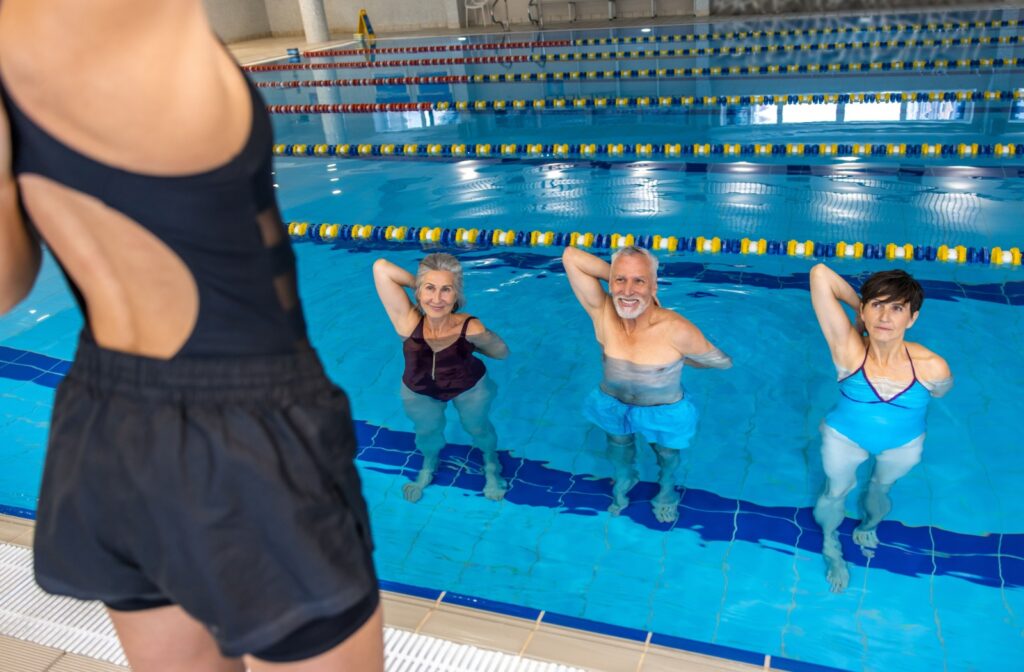Dementia can be one of the greatest challenges of aging. For seniors in memory care, loss of memories and changes in daily abilities can be overwhelming for both them and their loved ones.
While aging naturally affects our brains, dementia-related decline is not inevitable. Scientists have found that some lifestyle choices—especially staying active—can greatly impact brain health. For example, regular physical activity shows promise as a powerful way to protect cognitive health and potentially help prevent dementia. But, this doesn’t mean it can prevent it entirely or reverse its effects.
Learning more about dementia and Alzheimer’s can help you take proactive steps for yourself and your loved ones.
Understanding Dementia
Dementia refers to a group of conditions with symptoms that impair memory, thinking, and daily functioning, caused by various changes and damage to brain cells. Alzheimer’s disease is the most common type, but vascular dementia, Lewy body dementia, and frontotemporal dementia are also noteworthy types of dementia, each with unique challenges. Over 55 million people globally live with dementia, with nearly 10 million new cases diagnosed each year, so prevention has become even more important.
The Link Between Exercise & Brain Health
Physical exercise creates significant changes in the brain, going beyond building muscle or improving heart health. Regular activity triggers processes that support cognitive function and may help protect against worsening dementia.
Exercise increases blood flow to the brain, delivering oxygen and nutrients while clearing waste. This helps maintain healthy brain tissue and supports the growth of new blood vessels, a process called angiogenesis. It also boosts brain-derived neurotrophic factor (BDNF), a protein that promotes brain cell growth and survival.
Regular physical activity enhances neuroplasticity—the brain’s ability to form new connections and adapt with age. This helps the brain compensate for changes and resist damage from dementia-related diseases.
Studies show that physically active people have larger brain volumes in memory and learning areas like the hippocampus. They also have lower brain inflammation and reduced buildup of proteins linked to Alzheimer’s.
Most importantly, exercise strengthens cognitive reserve, the brain’s ability to function despite damage. A stronger reserve allows people to maintain normal function longer, even as dementia-related changes begin.
Types of Exercise That May Help
While any movement is beneficial, certain types of exercise show particularly promising results for brain health and dementia prevention.
Aerobic Exercise
Cardiovascular exercises like walking, swimming, and cycling boost brain health by increasing blood flow and promoting new brain cell growth. Just 150 minutes of moderate aerobic activity per week (30 minutes, 5 days a week) can significantly lower the risk of dementia.
Strength Training
Strength training helps maintain muscle, bone density, and cognitive function, improving memory, attention, and executive skills. Group fitness classes add social engagement, which further supports cognitive health.
Flexibility & Balance
Yoga, tai chi, and stretching improve physical stability while reducing stress and inflammation, benefiting brain health. These balance exercises are especially helpful for older adults, preventing falls and boosting confidence.
Creating an Exercise Plan
Starting an exercise routine can be easier by starting slow, choosing activities you enjoy, and gradually increasing intensity. Begin with 10–15 minutes of light activities like walking or dancing, and focus on movements that engage both body and mind. If you have health concerns, consult a healthcare provider first.
Working out with a buddy or joining a class can improve motivation and consistency. Senior-friendly programs are available, and regular, moderate activity is more effective than intense, occasional workouts. Celebrate progress and be patient—small steps can lead to big health improvements over time.

Additional Lifestyle Factors
Exercise & Brain Health
While exercise plays a critical role in brain health, it works best as part of a comprehensive approach to healthy aging.
Nutrition for Cognitive Function
A Mediterranean-style diet rich in fruits, vegetables, whole grains, fish, and healthy fats supports brain health. Staying hydrated, eating less processed foods, and drinking less alcohol can also contribute to cognitive wellness.
The Importance of Quality Sleep
Quality sleep allows the brain to clear waste products and consolidate memories. Aim for 7–9 hours of sleep nightly and maintain as consistent a sleep schedule as possible.
Social Engagement & Emotional Support
Social engagement stimulates the mind and provides emotional support. Regular interaction with friends, family, and community members may reduce dementia risk while enhancing quality of life.
Mental Stimulation & Cognitive Reserve
Mental stimulation through reading, puzzles, learning new skills, or pursuing hobbies helps build cognitive reserve. Challenge your brain regularly with activities that require concentration and problem-solving.
Managing Chronic Conditions
Managing chronic conditions like diabetes, high blood pressure, and depression also supports brain health, as these conditions can increase dementia risk when left uncontrolled.
Taking Action for Your Brain Health
Regular physical activity is one of the most effective tools for protecting cognitive function and potentially reducing the risk of dementia. While exercise can’t guarantee prevention, staying active greatly improves your odds and enhances overall quality of life.
The best part about exercise? It can be accessible to everyone. You don’t need fancy equipment, a gym membership, or perfect health to begin. Every step you take, every stretch you do, and every effort you put in adds up over time.
Start where you are and stay consistent—small actions lead to meaningful results. By prioritizing your brain health today, you’re giving your future self and loved ones a priceless gift.
For those in senior communities, consider organizing group walks, gentle exercise classes, or active hobby groups. Together, we can foster healthy aging and support cognitive wellness. The path to better brain health begins today—book a tour of Barton House Nashville and let’s start the journey together.



